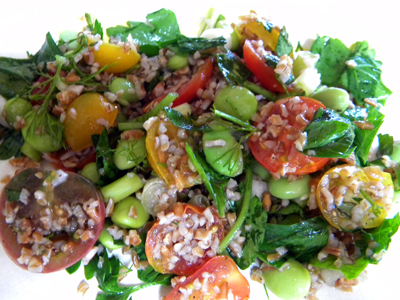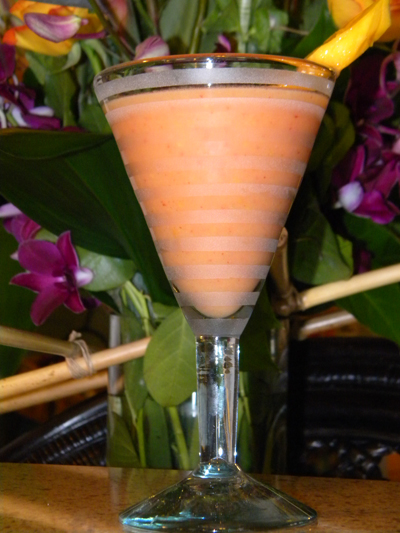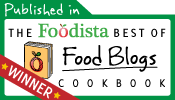bulgur
Bulgur is one of the unsung heroes of the grain world. A staple of the traditional Mediterranean diet for thousands of years, bulgur wheat has recently become popular in modern health food and vegetarian diets. Rich in “B” vitamins, iron, phosphorous, and manganese.
Bulgur is wheat in its whole form, which has been parboiled for quick cooking. Bulgur is sometimes confused with cracked wheat, which is crushed wheat grain that has not been parboiled. It comes in three types, coarse grind which has a consistency that is similar to that of rice and can be used in place of rice in any recipe. A medium grind is most commonly used for cereal and fillings, and fine grind is usually used for tabbouleh and other salads – such as the one below.
July 19, 2010 No Comments
mangosteen-another “superfood”
How can it only be Wednesday? Isn’t it strange how some weeks just fly by and others never seem to end?! I’m going to pretend it’s Friday and give you a cocktail recipe today, albeit a somewhat healthy one! (now that is a true oxymoron) It has a texture somewhat like a smoothie and with all that alcohol, it is smooth! Now you’ll have time to get to the store and be prepared when the weekend finally does roll along…
May 12, 2010 1 Comment
pomegranate – another super food
Pom tree in my backyard
It’s pomegranate season and I love pomegranates! They are beautiful and delicious. Great eaten straight out of the hand, or seed and juice to use in recipes, and pretty to dry and use in floral, household, and holiday decor.
Plus pomegranates are a “Super Food”. A single pomegranate or 1/2 cup of its juice provides 40% of an adult’s recommended daily allowance of vitamin C and is a rich source of folic acid and vitamins A and E. One pomegranate also contains three times the antioxidant properties of red wine or green tea.
Researchers report that the pomegranate’s antioxidants can keep bad LDL cholesterol from oxidizing (American Journal of Clinical Nutrition, May 2000). In addition, pomegranate juice, like aspirin, can help keep blood platelets from clumping together to form unwanted clots. Researchers have found that eight ounces of pomegranate juice daily for three months improved the amount of oxygen getting to the heart muscle of patients with coronary heart disease (American Journal of the College of Cardiology, Sept. 2005).
To juice a pomegranate, cut it in half (as you would citrus) and juice using a citrus juicer or reamer. Pour mixture through a cheesecloth-lined strainer. One large pomegranate will produce about 1/2 cup of juice.
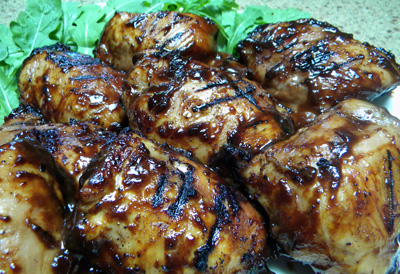
[Read more →]
October 1, 2009 2 Comments
quinoa – a super food
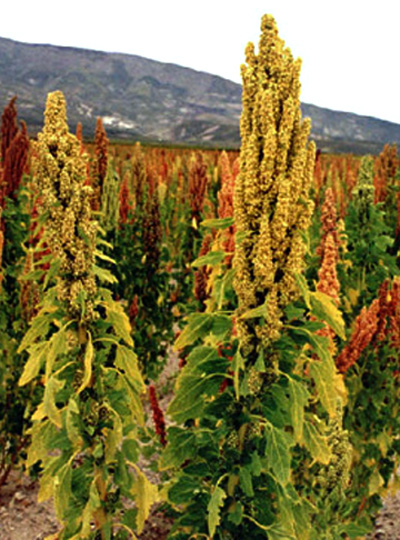
Quinoa plants
Quinoa (pronounced: kinwa), is considered to be a “Super Food” and for good reason, it is high in protein coming in at 13 to 20 percent, making it an excellent choice for vegetarians and vegans. Quinoa is most commonly considered a grain but is actually a seed that is a relative of leafy green vegetables like spinach and Swiss chard. It has a light fluffy texture and nutty taste. Quinoa is a recently rediscovered ancient “grain” once considered “the gold of the Incas.” While relatively new to the United States, quinoa has been cultivated in the Andean mountain regions of Peru, Chile, and Bolivia for over 5,000 years, and it has long been a staple food in the diets of the native Indians. The Incas considered it a sacred food and referred to it as the “mother seed.”
Unlike wheat or rice, which are low in lysine, quinoa contains a balanced set of essential amino acids, making it a complete protein source. It is a good source of fiber and phosphorus and is high in magnesium and iron. It is wheat and gluten-free and easy to digest. On top of all the great news, quinoa is easy to cook. So simmer up a few cups, store it in the fridge and add it to soups, salads, or just serve as a quick side dish, as you would rice.
[Read more →]
September 27, 2009 3 Comments

